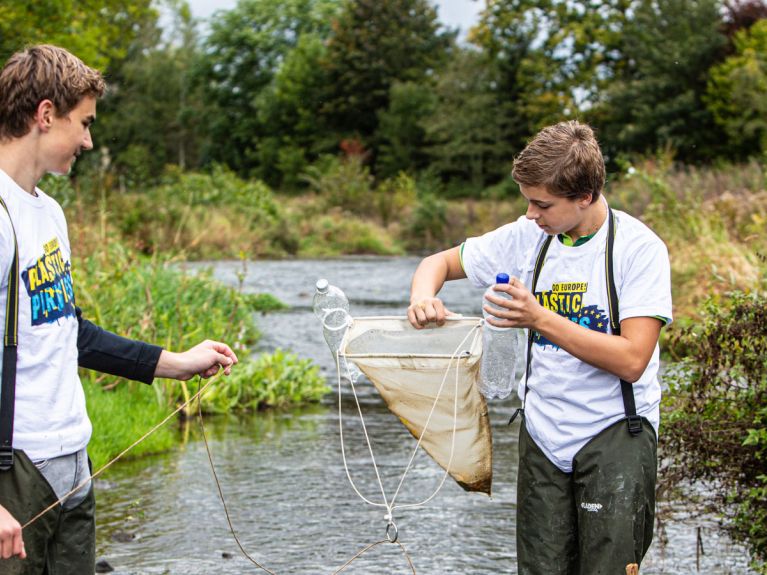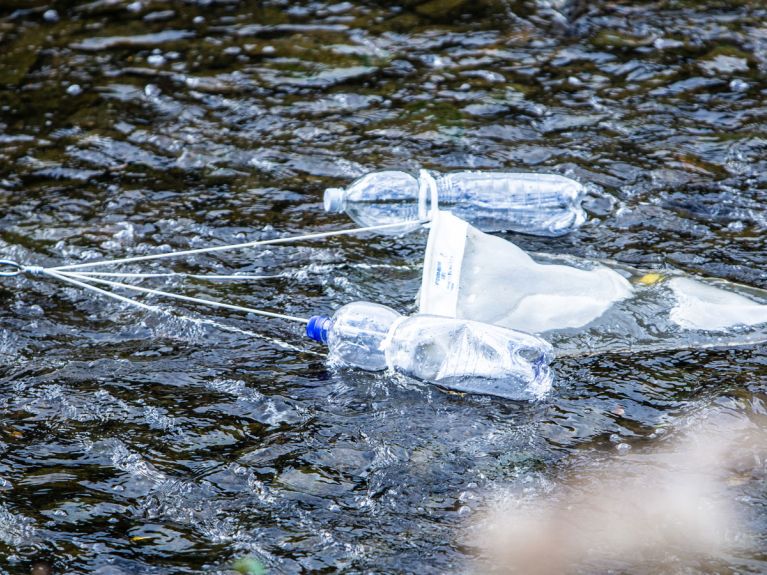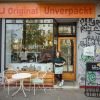The mission of the Plastic Pirates
A European citizen science project is giving children and young adults the chance to become researchers. Their goal is to reduce plastic waste in rivers and oceans.

In the spring, packages to be sent out to pirates all over Europe began piling up in the office of the marine biologist Dennis Brennecke. Kiel Science Factory dispatched several dozen of them every week. Brennecke reveals what the packages contain: instructions, plus a white net for the pirates to lower into the water – in rivers and streams throughout Germany. The nets are designed to catch not treasure, but waste. Plastic waste.
“Plastic Pirates – go Europe!” is the name of the European citizen science project that was rolled out once again in May 2022. Until the end of June, children and young people can take part in one of the biggest campaigns of the European Year of Youth in 2022. In Germany alone, almost 20,000 children and young people have participated in previous plastic pirates missions, gathering, documenting and cataloguing waste in waterways and on riverbanks. This led to larger amounts of more diverse data being generated at more sites than conventional teams of researchers could ever have collected within the same period of time.
At Kiel Science Factory, a joint initiative of Kiel University (CAU) and the Leibniz Institute for Science and Mathematics Education (IPN), Brennecke and his colleagues first sent the plastic pirates out to local waterways in 2016. Over the years, the project has become bigger and more international. “The ocean begins here” is one of the campaign’s slogans. “Plastic waste that can be found in and next to rivers and streams will end up in the ocean sooner or later. And the earlier and more precisely we can discover what is on its way to the world’s oceans, the better scientists and policymakers will be able to react”, says Brennecke.
Plastic pirates are active throughout Europe
During Germany’s presidency of the Council of the European Union in 2020, the campaign was expanded until 2021 to include the other two countries that held the trio presidency at the time, namely Portugal and Slovenia. Further European countries are to join in 2022. The project is funded by the education, science and research ministries of the participating European states.
In each country, partner institutes – like Kiel Science Factory in Germany – oversee the project’s implementation: classes of schoolchildren can take part, as can football teams, scouts or chess clubs. The only requirement is for groups to register as plastic pirates. This is because the tasks they are entrusted with are too big for one person alone, and are also fairly demanding. The children and young people, aged between ten and 16, examine a previously selected stretch of riverbank and are given various duties: while some hold the sampling net in the water for exactly one hour and determine the rate of water flow, others collect and catalogue waste along the riverbank. Yet others are responsible for reporting and collating the results.
1,200 stretches of riverbank have been studied in Germany to date. Particularly large numbers of plastic pirates have been active along the Rhine and Weser rivers. Significantly less data has been collected as yet in the east of Germany. “We are hoping that many more participants from Germany’s new states will join us”, says Dennis Brennecke.

Scientific approach motivates children and young adults
When German plastic pirates are busy working on the project, their data and samples end up at Kiel Science Factory; in Slovenia, they are sent to the National Institute of Biology in Ljubljana, where Mateja Grego and her team work. They examine the samples of microplastics that arrive and provide teachers or other coordinators with materials and the sampling nets.
Is the project well received? “Absolutely”, says Grego. “Classes of schoolchildren in particular really get stuck in. The pupils like the idea that the data they have gathered will be analysed scientifically. Many also publish their results on school websites. And we get a lot of positive feedback from teachers, who often get involved several times.” This is confirmed by Dennis Brennecke, who has found that children and young adults are much more motivated when it is clear to them that their work is serving a scientific purpose.
Plastic waste data from all over the world
The international reach of the campaign is clearly visible online: all plastic pirates and the riverbank sections they have studied are highlighted on a digital map of the world. The project already knows no bounds, in other words. Groups can always join in, no matter where in the world they are. Entries from Chile can even be found on the map. “The advantage is that we can really work globally”, says marine biologist Brennecke. “The material is available and can easily be translated into any language. We can pool data from all over the world.”
The work being done by the plastic pirates can also make a concrete contribution to finding solutions in the fight against plastic waste. Brennecke uses an example to explain what form this can take: “We can examine how the occurrence and structure of waste changes in response to new laws, for instance following the ban on disposable plastics in the summer of 2021.”
Further information about the “Plastic Pirates go Europe” campaign can be found here


